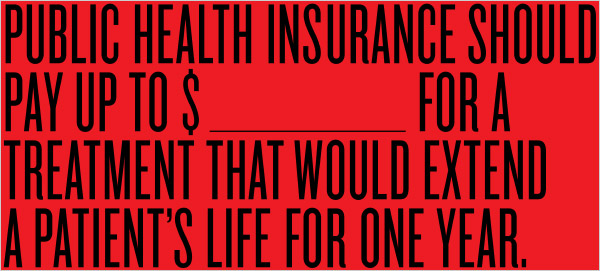Peter Singer, always interesting, on rationing health care (long).
Why We Must Ration Health Care
You have advanced kidney cancer. It will kill you, probably in the next year or two. A drug called Sutent slows the spread of the cancer and may give you an extra six months, but at a cost of $54,000. Is a few more months worth that much?
If you can afford it, you probably would pay that much, or more, to live longer, even if your quality of life wasn’t going to be good. But suppose it’s not you with the cancer but a stranger covered by your health-insurance fund. If the insurer provides this man — and everyone else like him — with Sutent, your premiums will increase. Do you still think the drug is a good value? Suppose the treatment cost a million dollars. Would it be worth it then? Ten million? Is there any limit to how much you would want your insurer to pay for a drug that adds six months to someone’s life? If there is any point at which you say, “No, an extra six months isn’t worth that much,” then you think that health care should be rationed.
…
One final comment. It is common for opponents of health care rationing to point to Canada and Britain as examples of where we might end up if we get “socialized medicine.” On a blog on Fox News earlier this year, the conservative writer John Lott wrote, “Americans should ask Canadians and Brits — people who have long suffered from rationing — how happy they are with central government decisions on eliminating ‘unnecessary’ health care.” There is no particular reason that the United States should copy the British or Canadian forms of universal coverage, rather than one of the different arrangements that have developed in other industrialized nations, some of which may be better. But as it happens, last year the Gallup organization did ask Canadians and Brits, and people in many different countries, if they have confidence in “health care or medical systems” in their country. In Canada, 73 percent answered this question affirmatively. Coincidentally, an identical percentage of Britons gave the same answer. In the United States, despite spending much more, per person, on health care, the figure was only 56 percent.
